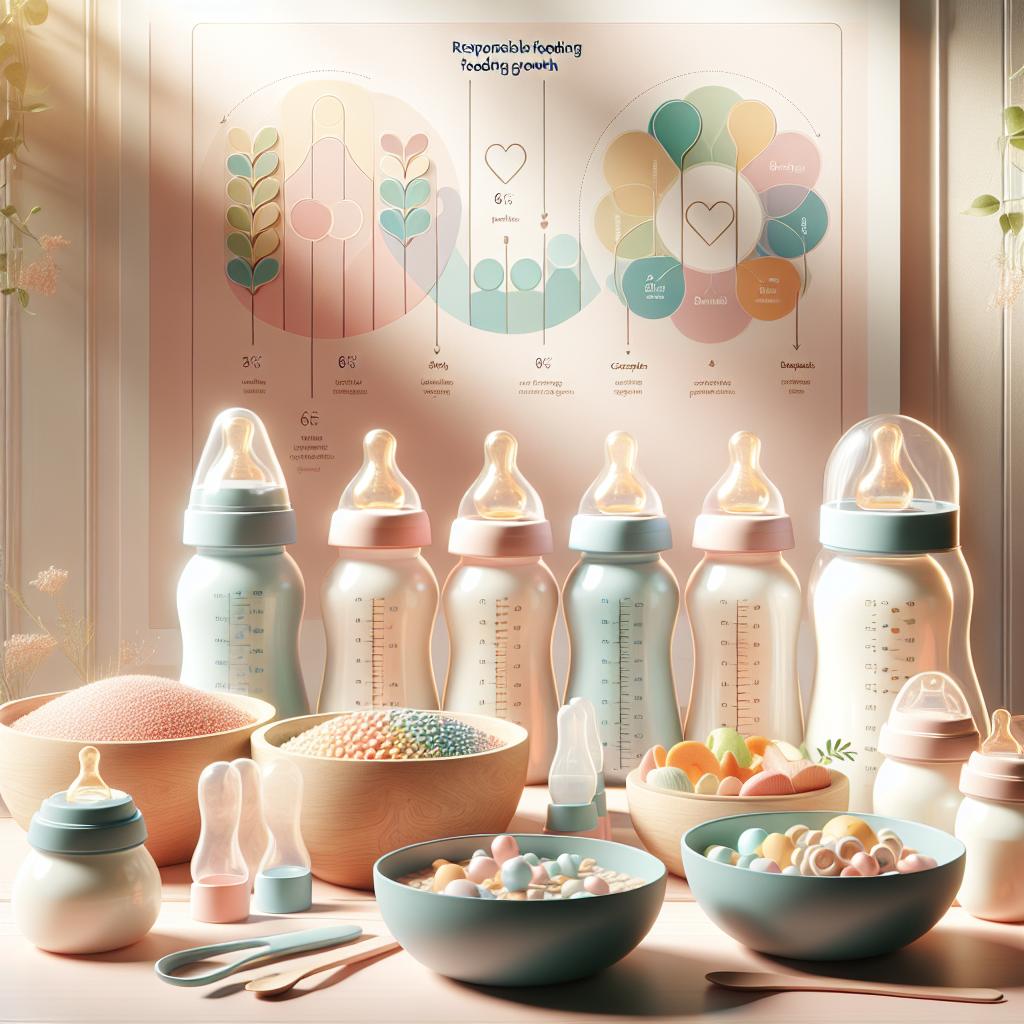“`
Understanding Responsible Bottle Feeding Growth
The Importance of Responsible Bottle Feeding
Feeding your baby is more than just providing nutrition; it’s about laying the foundation for their overall growth and well-being. One way to ensure your child gets the best start in life is through responsible feeding growth. This term refers to the practice of choosing the most suitable feeding methods, nutrients, and best baby bottles for your baby’s unique needs.
There is a wealth of benefits linked to responsible feeding. It ensures your baby receives the right balance of nutrients and supports their physical and cognitive development. This practice also minimises the risk of overfeeding and resulting health complications like childhood obesity and tooth decay. Plus, it encourages bonding and emotional attachment between parents and their babies.
Tips for Responsible Bottle-Feeding
To help you navigate the process of responsible bottle feeding, here are some expert-approved tips:
- Choose the Right Formula: Not all baby formulas are created equal. It’s essential to choose one that aligns with your baby’s age, dietary requirements, and digestive health. For reliable information on formula feeding, refer to resources like Pregnancy, Birth and Baby or The National Center for Biotechnology Information.
- Opt for a Quality Baby Bottle: The best baby bottles are those that mimic natural breastfeeding to ease the transition and prevent nipple confusion. Bottles like these, known as biomimetic bottles, can help make bottle-feeding more comfortable for both parent and baby.
- Monitor Your Baby’s Intake: Ensure your baby is getting the right amount of formula for their weight and age. Overfeeding can often lead to digestive discomfort and other health issues. For guidance, consider the Pediatric Nutrition Guidelines provided by the British Columbia Center for Disease Control.
- Promote Bonding: Feeding time is an excellent opportunity for bonding. Maintain eye contact, talk to your baby, and switch sides midway through the feeding to stimulate brain development.
Responsible Bottle-Feeding Supports Baby’s Growth
When done right, bottle-feeding can play a crucial role in nurturing your little one’s development. By adopting responsible feeding practices, you’re not just caring for their immediate nutritional needs but also investing in their long-term health and well-being.
Remember, what works best for one baby may not work for another. Therefore, it’s essential to be patient, flexible, and ready to adapt your feeding approach based on your child’s evolving needs. If uncertainties arise, don’t hesitate to seek professional advice to guide your journey in raising a healthy, happy baby.
“`
The Role of Nutrition in Your Baby’s Development
As your baby grows, so do their nutritional needs. The United States Department of Agriculture offers valuable information on the importance of balance and variety in an infant’s diet. Protein, carbohydrates, fats, and a mix of vitamins and minerals support different aspects of your baby’s health and development:
- Vitamins and Minerals: These tiny but essential nutrients aid in nearly every function of your baby’s body. From building strong bones and teeth to supporting brain development, vitamins and minerals are a fundamental part of your child’s nutrition.
- Protein: Protein is a critical building block for your baby’s muscles, skin, enzymes, and hormones. It’s vital for growth and tissue repair.
- Carbohydrates: These provide your baby with energy, aiding brain development and supporting the functioning of the nervous and digestive systems.
- Fats: Fats make up a significant part of your baby’s brain, acting as a critical energy source and helping to absorb vitamins.
Through balanced bottle feeding, you can ensure your little one gets a variety of nutrients, setting the stage for a healthy, active life.
Nurturing Emotional Health Through Bottle Feeding
Emotional well-being plays a crucial role in your child’s overall development. According to the Ellyn Satter Institute, it’s important to foster a positive feeding environment, which can impact your child’s relationship with food and their emotional health.
- Respect Your Baby’s Cues: Pay close attention to signs of hunger or fullness. Allowing your baby to regulate their own feeding encourages self-regulation skills that can extend beyond feeding and into other areas of their life.
- Foster a Pleasant Environment: Make feeding time a relaxed and enjoyable experience. This can help your baby form positive associations with eating and nurture your emotional bond.
- Keep Consistency: Keeping a regular feeding schedule can give your baby a sense of security and predictability, important aspects of emotional health.
Supporting a Healthy Immune System Through Bottle Feeding
The feeding choices you make for your baby can significantly impact their immune system. Feeding a balanced diet enables your baby’s immune system to fight off potential infections and illnesses effectively.
- Probiotics: Some baby formulas contain probiotics, beneficial bacteria that can boost your baby’s gut health and enhance their immune system.
- Vitamins: Certain vitamins like A, C, B6, and E are known to help immune functions in your baby.
- Healthy Fats: Omega-3 and Omega-6 are essential fats that support your baby’s brain development and immune response.
Following these guidelines and incorporating a variety of nutrients can support a stronger immune system in your baby, keeping them healthier and happier in their early years.
Bottle Feeding and Brain Development
Your baby’s brain undergoes unparalleled growth in the first few years of life. Research from the Centers for Disease Control and Prevention showed that the right nutrition could help support critical brain development during these years. Choosing a baby formula rich in Omega-3 fats (especially DHA), choline, iron, and iodine can support cognitive development, including language learning and memory.
From ensuring your baby’s nutritional needs are met to fostering their emotional health, responsible bottle feeding is a comprehensive approach to infant care. It’s about making mindful decisions that align with your child’s unique needs and growth – shaping their well-being today and for the future.
For more insights on infant nutrition and feeding, visit the Maine Department of Health and Human Services.

